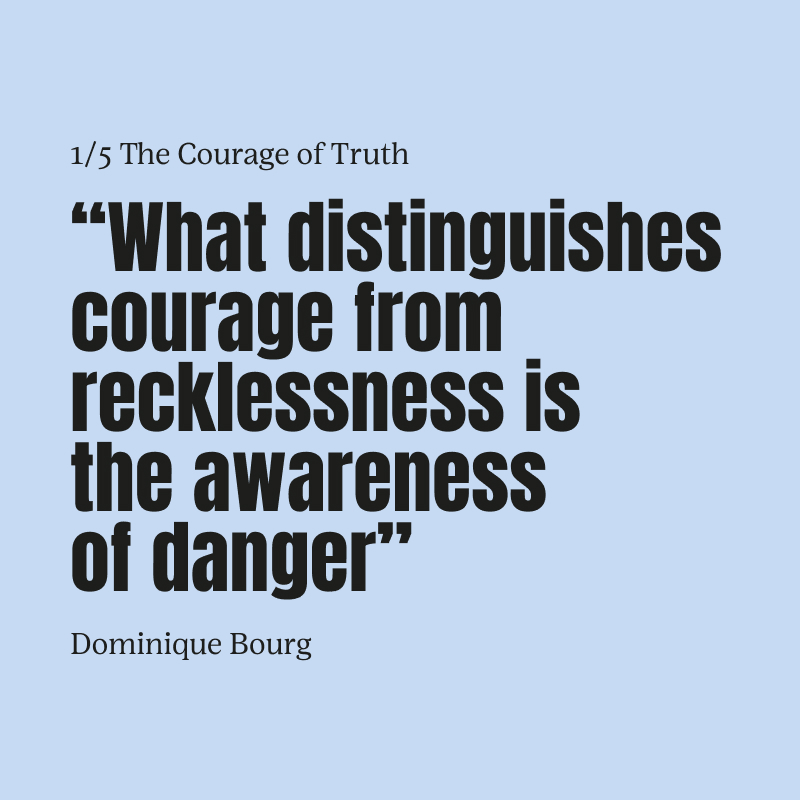
The Courage of truth
“The first obstacle to overcome is denial.”
Virginie Morgon
Let’s first start with this particular form of courage – the courage of truth – as it’s at the origin of any commitment.
“A primary obstacle to changing business as usual is that leaders don’t fully grasp the notion of ‘disruption’ and how to roll it out — no one has trained them for this,” says Barthélémy Guislain, Chairman of the Management Board, Mulliez Family Association.
“It’s hard to let go of long-held beliefs, but that’s where it all starts,”
says Cécile Beliot
This task is far from trivial. If ignorance gives you a false sense of self-confidence, then the pursuit of truth, on the other hand, means exposing and acknowledging your own vulnerability, your biases and your shortcomings.
It’s both a moral understanding and a struggle: to not let oneself succumb to complacency and blindness, to not confine oneself (1) to “looking at the symptom without digging to the root,” to quote Michel Aballea, former Managing Director of Decathlon, who launched a transition plan in 2020 with the goal of reducing the company’s carbon emissions by 40% by 2026.
“Until leaders are willing to face up to the science, they will be in denial about their responsibility.” – Barthelemy Guislain
This mentality therefore requires a sense of skepticism as well as an appetite for truth, in all its complexity and nuance.
It means two things.
→ First, we have to shift perspectives — removing our short-term blinders in order to take the long view of events and their consequences, because the lack of a long-term perspective is one of the major risks to good governance (2). “We were taught to drive performance by the quarter. I had to give up all these instincts to be able to comprehend the long-term consequences of our actions.” – Cécile Beliot, general manager of the BEL Group.
“Short-term thinking is near-sighted. What matters most is long-term resilience,”
Michel Aballea
→ Then, we need to fill in gaps by bringing in the right expertise: “A company’s true strength lies in its ability to forge ties with its employees, suppliers, investors and customers. A resilient company needs these relationships in order to evolve,” — Emery Jacquillat, CEO of Camif, the first business in France to obtain a “mission-driven company” status.
“You have to dare to join the debate, because a company is inherently political,” says Philippe Blondiaux, Global Chief Financial Officer at Chanel. “You have to surround yourself with different perspectives to develop your ability to go beyond your own personal interests and to make decisions that put the interests of society first.”
It’s said that the complexity of a management system must be at least equal to the complexity of its environment. Diverse viewpoints from a variety areas of expertise are essential to understanding issues from a global perspective and truly grasping what’s at stake — socially, environmentally, economically.
And after the truth?
“Courage is not sweeping things under the rug.” — Michel Aballea. Courage is when the truth is shared and not hidden.
Eric Rampelberg, Vice President and General Manager – Southern Europe, India & Southeast Asia of Interface, says, “Courage is being transparent with stakeholders and telling the truth, even when you know you may be criticized or belittled.”
René Char defined “lucidity” (which comes from the Latin “lux, lucis,” meaning light) as the “injury closest to the sun.” (3) What could be closer, then, to lucidity — both scorching and illuminating — than truth? Speaking the truth requires taking a risk — you might get burned — but it’s a risk worth taking if it means moving the needle forward for the greater good.
As the saying goes, “The truth hurts.” But to borrow from another old adage, the truth will set you free.
∗∗∗
(1) J. Birnbaum, Le courage de la nuance, Seuil (2021)
(2) P.-Y. Gomez, La gouvernance d’entreprise, Que sais-je ? (2021)
(3) R. Char, Feuillets d’Hypnos (1946)
Read next:
- Generation Glasgow